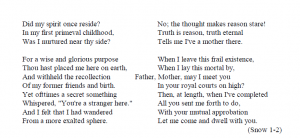Samuel S. Harkness and Dr. Richard H. Cracroft, English
I still recall the day over four years ago when a General Authority proclaimed the LDS hymnal to be a ‘book of scripture.’ His seemingly bold declaration surprised me; but after reconsideration, it made sense. Some of the most spiritual times in my life have been accompanied by these “songs of the heart” (Doctrine and Covenants 45) Thus, the Preface of the hymnal reads, “Some of the greatest sermons are preached by the singing of hymns” (First Presidency ix). From then on, I viewed the hymns in a different light.
I share that to illustrate what led me to my research. Despite the revelry and worship I place in these hymns, I know little of their origin. With my background in the English discipline, I thought the proper method of examination should be to look at the hymns in their purest state, as poetry. Even though the hymns were the catalyst to the research, they were not the focus. Mormon and secular authors both shared scrutiny as I tried to observe and discover the molding influences of early Mormon poetry.
At the outset of the research, Professor Cracroft wrote, “Amidst the many biographical accounts and collections of works written and assembled by LDS scholars through most of this century, there have been few serious attempts to approach LDS poetry critically and contextually.” I found this to be completely true. It was difficult to find any literary analysis of nineteenth century poetry. The Early Mormon poetry seems to hold little literary weight to us today. Most studies focus solely on historical and doctrinal viewpoints.
With the help of Professor Cracroft, I decided to focus on the influence of transcendentalism. This literary movement is defined as an “adherence to an idealistic system of thought based on a belief in the essential unity of all creation, the innate goodness of humankind, and the supremacy of insight over logic and experience for the revelation of the deepest truths” (“Transcendentalism” 1128). Transcendentalism then represented the “absolute Good, Truth, and Beauty” (Horton and Edwards 116) while emphasizing individual discernment.
Guided by this definition, I read several works of Eliza R. Snow, Orson F. Whitney, John Lyon, Parley P. Pratt and others. All showed strong and unmistakable transcendental views, but my attention was given to Eliza R. Snow. She is perhaps the most recognized Mormon author of the nineteenth century. I’ll share her most renowned poem which became titled later “Oh my Father,”
Not only does this poem delve into profound doctrine but it carries the transcendental tones of conscience, truth and the “value of intuition in matters of moral guidance” (Dictionary of Literary Terms 994). In terms of historical accuracy, I’m unsure as to the exact exposure Eliza R. Snow had to secular poets of the time. Before her conversion in April of 1835, she had received a formal education and had even been published. One can assume the academic background of Eliza put her attention on the literary world of the time.
A much larger example of Eliza’s awareness to the literature around her is seen when contrasting her work “My First View of a Western Prairie” with a similar poem of William Cullen Bryant. “It’s as if Eliza had Bryant’s text in one hand while she wrote with the other” (Lambert). The resemblance in form and subject are striking. It’s difficult to quantify the results of my research because it is incomplete. I’ve only scratched the surface on this subject and hope to better locate and identify the forming influences on nineteenth century Mormon poetry. Professor Cracroft’s insight and patience has been remarkable. His influence has propelled me to consider compiling an anthology of early Mormon poetry.
Works Cited
- Doctrine and Covenants of the Church of Jesus Christ of Latter-Day Saints. Cambridge: University Press, 1989.
- Dictionary of Literary Terms and Literary Theory. 3ed. Worcester: Billing & Sons Ltd., 1991. First Presidency. Preface. Hymns of The Church of Jesus Christ of Latter-Day Saints. By First Presidency. Salt Lake City: Deseret Book, 1985, ix-x.
- Horton, Rod W., and Herbert W. Edwards. Backgrounds of American Literary Thought. 3rd ed. Englewood Cliffs: Prentice Hall, 1974.
- Lambert, Neil. Personal Interview. October 1997. Snow, Eliza R. Poems: Religious, Historical & Political. Liverpool: R. James, 1856.
- “Transcendentalism.” Encyclopedia of Literature. 1995 ed.


